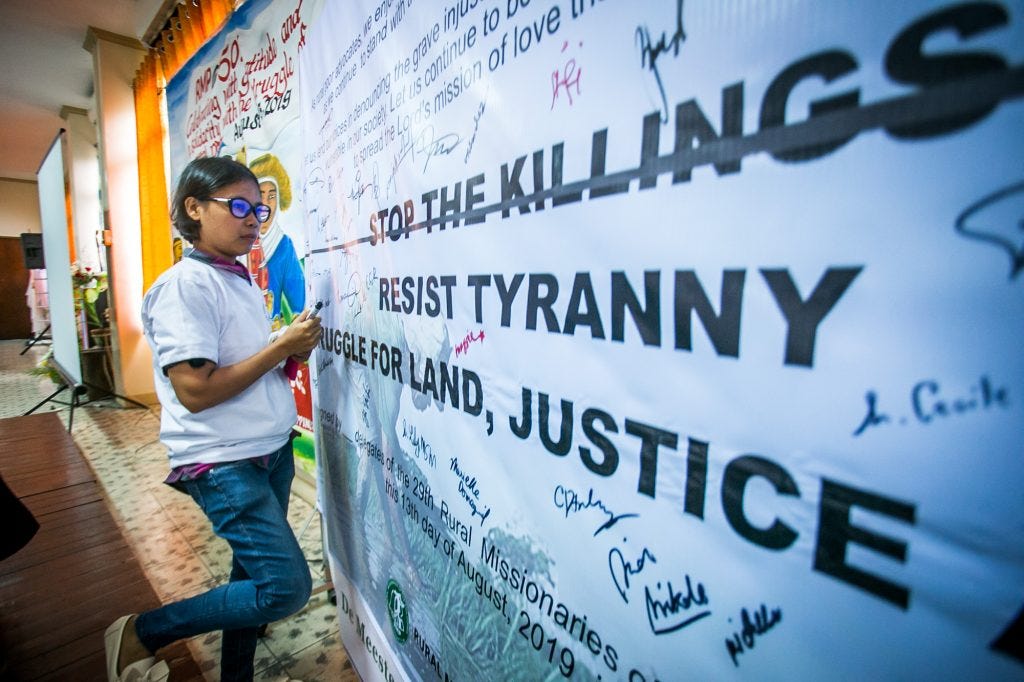[ad_1]

Philippine police today (March 7) staged gory raids on leftists in the southern part of Luzon, the country’s main island, killing nine persons and arresting six more believed to belong to activist groups. It was one of the biggest one-day offensives of Rodrigo Duterte’s presidency against activist groups, many of which have been “red-tagged” by his administration. The killings come two days after Duterte delivered a bloodthirsty speech to the “National Task Force to End Local Communist Armed Conflict,” which he created to end a pesky but hardly threatening insurgency.
“If there’s an encounter and you see them armed, kill, kill them, don’t mind human rights,” he told the group. “I will be the one to go to prison, I don’t have qualms.” Duterte has already been named in two complaints over crimes against humanity filed with the International Criminal Court in The Hague for his anti-drug crackdown, which has left thousands dead at the hands of police and murder squads since he took office in 2016.
In his speech, according to the news portal Rappler, Duterte repeated a claim he made that rebels made an impossible demand—a coalition government—which he said was not negotiable.
“The leadership of (Communist leader Jose Maria Sison) submitted a document, which was not very clear but somehow could lead to a coalition government but it’s non-negotiable for me, so there’s no hope of ending this insurgency, I will try.” Sison, the founder of the communist party of the Philippines, has been in exile in The Netherlands for decades.
Although police said they were serving search warrants, critics said the operations looked more like executions. It is also questionable whether those who were gunned down were actually Communists, or were merely leftist activists. At least 13 human rights defenders have been killed over the past four years for working for leftist, grass-roots organizations that authorities have claimed with little evidence were linked to the communist insurgency.
“According to one of the groups, Altermidya, one of those shot dead was Manny Asuncion, the coordinator of the leftist group Bayan in Cavite province,” according to a press release by Human Rights Watch. “Two unidentified members of an urban poor group in Montalban town, Rizal province, were also killed. In Batangas, a couple. Chai Lemita-Evangelista and Ariel Evangelista, who both worked for fishers’ rights, were arrested and later found dead, according to labor union Kilusang Mayo Uno. Among those arrested in Laguna province are another labor leader, another Bayan staff, and a paralegal for the political prisoner rights group Kapatid. Human Rights Watch is seriously concerned about reports of raids conducted by law enforcement authorities that resulted in activists’ deaths in the provinces of Laguna, Cavite, Batangas, and Rizal. Based on these reports, these raids appear to be part of a coordinated plan by the authorities to raid, arrest, and even kill activists in their homes and offices.
The raids, Human Rights Watch said, “are clearly part of the government’s increasingly brutal counter-insurgency campaign aimed at eliminating the 52-year-old Communist insurgency. The fundamental problem is this campaign no longer makes any distinction between armed rebels and noncombatant activists, labor leaders, and rights defenders. It is not a coincidence that these deadly raids happened two days after President Rodrigo Duterte ordered police and military to “kill all” communists and “don’t mind human rights.”
It is also “not a coincidence that these incidents occurred in provinces overseen by the Southern Luzon Command of the Armed Forces of the Philippines, led by Lt. Gen. Antonio Parlade Jr., who has led a vicious ‘red-tagging’ campaign against activists by accusing them of rebel links without providing any evidence that can stand up in a court of law, according to Phil Robertson, Human Rights Watch’s Deputy Asia director.
Duterte’s government has been growing progressively more violent and repressive as the end of his term nears. In January, the secretary of national defense announced that the government would break a decades-old accord with the university that barred the military and police from the campus – on the apparent grounds that it is a recruitment environment for communists classified as terrorists. In a kind of stage rehearsal, on December 10, armed Philippine police raided the home of a young journalist named Lady Ann Salem, an editor at Manila Today, an English-language website, and later charged her and six trade unionists with illegal possession of weapons that her allies said had been planted after she was forced to turn her back during the raid. Salem, a member of the National Union of Journalists of the Philippines, had been “red-tagged” as having Communist connections by a Philippine Senate committee.
Red-tagging refers to the blacklisting of individuals or organizations critical or not fully supportive of the actions of a sitting government administration and in the past has been a harbinger of ominous things to come. Red-tagging has implications of either communist or terrorist associations and far too often has preceded violence. It is a relic of the cold war. The United Nations, Amnesty International and Human Rights Watch have all warned that it encourages assassinations and retaliations.
In a phone interview with Rappler, Calabarzon police chief Brigadier General Felipe Natividad said Sunday’s operations were only in compliance with Duterte’s Executive Order No. 70, which ordered a whole-of-nation approach to ending the communist insurgency in the Philippines.
The executive order emphasized the need for “delivery of basic services and social development packages in conflict-affected,” but the Duterte government has been bent on using police and military to assault communist forces, including activists who have been red-tagged without basis.
This article is among the stories we choose to make widely available. If you wish to get the full Asia Sentinel experience and access more exclusive content, please do subscribe to us.
[ad_2]
Source link